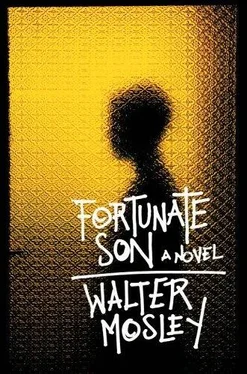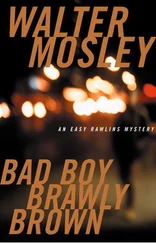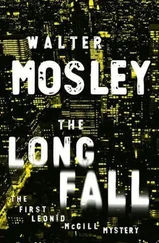“But what about my dad and May?”
“The Rickerts will make a very nice home for you, Thomas,” Hardy said. He had pink skin, short gray and black hairs on his head and chin, and glistening droplets of sweat across his forehead like a netting of glass beads.
“Do I have to?” Thomas asked.
“It’s what’s best,” the social worker told him. “They’ll send you to school and be home every night. And they have three other boys in their care, so you’ll have brothers to play with.”
Three days later, Thomas was driven to the Rickerts’ house by the social worker. Thomas’s limp had become permanent by then, but he didn’t mind. He was much more worried about the family he had come to live with.
Robert Rickert was thin as a rail and the color of a green olive that’s turning brown. Melba, his wife, was deep brown and as broad as the doorway. The husband was silent and sour, but his wife was mean.
Thomas’s foster brothers had names, but he never learned them. They were all about the same age, and the first night they told him about the gang they were in at school.
“Nobody messes with us,” the biggest boy with the silver tooth said. “’Cause they know that it’s all’a us then.”
“You wit’ us?” the smaller, darker boy asked. “’Cause if you ain’t, we gonna mess you up bad.”
The first night at the Rickert house, Thomas was sent to bed without dessert because he didn’t answer half of the questions Melba asked. He didn’t want the sherbet anyway, but he knew that she wanted to hurt his feelings by depriving him.
The George Washington Carver School classroom for slow third-graders was loud, and the teacher (whose name Thomas also forgot) didn’t teach very much. Thomas got into two fights the first day. Instead of going home he wandered away; then, after asking directions, he headed toward Central. When he got to his old block, he climbed under the fence and into his blessed valley.
Skully was gone. Thomas hoped that the puppy had found a home with children that loved him.
No Man was still there. He had taken a mate to live with, another green parrot, and together they built a nest in the top branches of the oak tree.
After two days, Thomas went to the alley where Pedro had sold drugs. The older boy had told him that little kids like Thomas could make good money delivering for the drug dealers there.
“Li’l kids can’t get into trouble if they get busted by the cops,” Pedro had told him. “So they pay you good money just to walk down the street.”
In the alley Thomas met a boy named Chilly. Chilly was even smaller than Thomas, and he had an oval-shaped head and freckles on his nose. He wore a gray hat with a brim and green sunglasses. Chilly told him about the main man — Tremont. Tremont was a tall man with wide shoulders, big muscles, and a scar that started at the left side of his forehead and went in an arc down the center of his face all the way to the chin.
“You wanna run fo’ me, li’l man?”
“Yes, sir.”
“Where’s your mama?”
“Dead.”
“Where’s yo’ daddy?”
“In jail.”
“Where you livin’?”
“With my friend Bruno sometime, an’ with May,” he lied.
Tremont squatted down so that he could look Thomas in the eye.
“How old are you, li’l man?”
“Nine and a half.”
“Who told you about this place?”
“Pedro. He used to work here.”
“If I give you work an’ you tell I will kill you. Do you understand that?”
“I won’t tell. I swear.”
The first job Tremont gave Thomas was to carry a small paper bag to an address four blocks away. A lovely brown woman in a violet dressing gown answered the door.
“Are you Lucky?” she asked.
She knelt down and put her hands on his sides. This tickled, and Thomas giggled.
“Aren’t you cute,” the woman said.
She picked him up and hugged him.
“My name is Cilla,” she said. “I’m Tremont’s girl.”
She carried Thomas down a dark and narrow hallway into a small yellow kitchen. There she sat the boy at a table and fed him half a ham sandwich and part of a pomegranate.
While he ate she took the paper bag and opened it. She took out a wad of money and counted it — twice.
“Tremont send you to me to make sure you could do the job,” Cilla told him. “He told you not to look in the bag, and he put a tape on the inside so that I could see that you didn’t. He wanna know that you can be trusted. How old are you?”
“Nine.”
“You look younger.”
Thomas kicked his feet and ate his sandwich.
“How come you limpin’?”
“I fell off a buildin’ an’ broke my hip.”
Thomas smacked his lips after eating the sandwich. He hadn’t had a meal in a few days.
“You’re so cute.” Cilla leaned over and gave Thomas a slow kiss on his mouth.
He closed his eyes and hugged his shoulder with his chin because the kiss both tickled and excited him.
After that he worked every afternoon for Tremont. Mostly he took white packages, which he kept in his underpants, to people’s houses and apartments between four and seven, after other little kids were out of school. Once a week Tremont would send Thomas to Cilla’s, where the boy would take a bath and wash his clothes in a small washing machine in the kitchen.
Thomas made twenty dollars a day, and nobody molested him on the streets because people had seen him limping down the sidewalks with Chilly, and everybody knew that Chilly was with Tremont. And nobody messed with Tremont’s peeps.
After four weeks Thomas went to Bruno’s house. His friend’s elderly aunt Till answered the door.
“Hello, young man,” she said, with eyes that held no memory of him.
“Is Bruno home, Aunt Till?”
“No,” she said, looking as if someone had just kicked her in the stomach. “Bruno died.”
“No. From what?”
“It’s the leukemia got him. He was in so much pain.”
“Hi, Lucky,” Monique said. She had come up from behind the bent-over older woman.
“Hi, Monique,” came Thomas’s joyless greeting.
The older woman turned away, and Thomas could see Monique’s big belly.
“Come on in,” the young woman said.
She took Thomas into the kitchen and served him a glass of lime-flavored Kool-Aid.
“I thought the county took you away, Lucky,” Monique said after lowering herself into the kitchen chair.
“I runned away from them.”
“When?”
“Long time ago.”
“Where you livin’?”
“With a woman named Cilla,” he said. Thomas didn’t want to tell her that the police hadn’t changed the lock to the cellar at the back of his clubhouse. He found the key where he’d left it — under the crate next to Alicia’s hidden tomb.
“An’ what you doin’?” the girl asked.
“Nuthin’. What about you?”
She put her hand on her belly. “I’m havin’ a baby. It’s Tony Williams’s boy, but he got shot. We got a studio ’partment ovah on Hooper, but now I’m there by myself. But I cain’t hardly pay no rent so I guess I’ma be in the street.”
“Why don’t you stay here?”
“I could but they wanna treat me like a baby, an’ here I’m havin’ a child’a my own.”
“I got three hundred dollars,” the boy said to the big girl, now made bigger by her pregnancy.
“You do?”
“I could give it to you,” he said. “I mean, I was gonna go out wit’ Bruno an’ buy a whole lotta Fantastic Fours with it. But I bet he would want me t’give it to you.”
Monique’s apartment was just a room. One wall had a stove against it, and there was a big footed bathtub next to the window on the opposite wall. Between these was the bed. Thomas slept in the bed with Monique that night and every night after for the next three years.
Читать дальше












